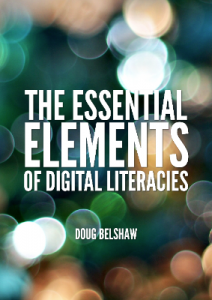An update on ‘The Essential Elements of Digital Literacies’

As regular readers of this blog will be aware, ever since finishing my Ed.D. thesis in 2012 I’ve been working on an iterative e-book called The Essential Elements of Digital Literacies. I’m excited to announce that I’m planning to launch v1.0 on 27th June 2014.
This is an ‘iterative’ e-book because people have been able to buy into it ever since v0.1. You can find more about this ‘OpenBeta’ model here. Fundamental to the process is getting feedback from readers. I’m glad to say that you haven’t let me down, and the book is better as a result. Thank you for that.
The aim is for the e-book to be practically useful while not being shy about theory. People have said that it’s proving useful for use with trainee teachers and other undergraduates, so I’m glad it’s already having the desired effect!
My plans for getting to a v1.0 release of The Essential Elements of Digital Literacies are as follows:
27th May
Release v0.99 of the e-book. This will be textually complete and form the basis of a crowdsourced copyediting process that will take a few weeks.
27th June
Release v1.0 of the e-book. This will have benefitted from more eyes than just mine in terms of coherence and copyediting. Should they agree, these people will be given special thanks in the foreword. It will definitely be available in PDF, and I’ll work with people to get it available in ePub and Kindle formats.
Ongoing
I’m not the only conduit for ideas in this space, so I’m planning to follow the lead of people like Yochai Benkler and create a wiki to accompany the book. This will be structured in a similar way to the wiki that is a companion to Benkler’s The Wealth of Networks.
A few points to finish off.
- Now is be a great time to buy into the book. It’ll save you a couple of pounds compared to the price of v0.99 or v1.0 (you get the updates for free).
- This was never about the money. Yes, I’ve been able to pay recurring digital subscriptions from my Paypal balance instead of my credit card, but that wasn’t the aim. The financial element here was to get people to buy into the process early. Once this happened, I could ask for feedback – which I’m delighted to have received on a fairly regular basis.
- If you’d like to get involved with the launch, please do get in touch! Examples: the visual design of v1.0, translating the book into another language, or making Bitcoin payments a reality. I’m @dajbelshaw or you can email me at [email protected].
A special thanks once again to those who have encouraged me and provided feedback over the last couple of years. You’re all very kind. We’re nearly there – just this last hurdle to clear!
More on this next week with the release of v0.99. 🙂


![v0.9 of ‘The Essential Elements of Digital Literacies’ now available! [E-BOOK]](https://dougbelshaw.com/blog/wp-content/uploads/2014/01/flurry.jpg)